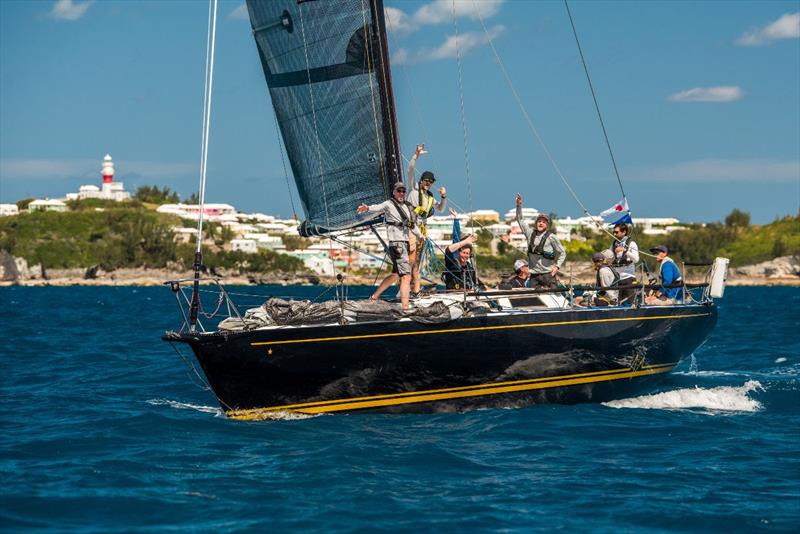
Newport Bermuda Race 2024 will be scored using a Forecast Time Correction Factor
by Bermuda Race 3 Dec 2023 11:36 PST
June 19, 2024

Cookie Monster finishes in 2022 © Chris Burville
How often have you thought the other boat experienced 'lucky' weather?
The Bermuda Race Organizing Committee (BROC) is proud to announce that the 2024 race will be the first Ocean Race to use Forecast - Time Correction Factor (F-TCF) as a scoring model. The intention to use F-TCF scoring was communicated in the 2024 NOR published in June (now amended), and we are sharing additional details about this innovative scoring method.
The BROC is always considering opportunities to improve the fairness of our race and a major target for improvement has been the scoring method. After careful consideration and analysis, the BROC is confident that F-TCF offers a substantial improvement in fairness and clarity over the previously used method, Performance Curve Scoring (PCS).
What is F-TCF and how does it work?
- Hours before the start of the race, a predicted elapsed time to finish for every boat will be determined using timely weather and current grib files and each boat's polar file to determine the optimized route using Expedition.
- Within each division, a forecast - time correction factor (F-TCF) will be calculated for each boat. The F-TCF is the ratio of a scratch boat's predicted elapsed time to complete the course, to the predicted elapsed time of each boat in the division.
- The F-TCF for every boat will be communicated to the fleet the morning of the race.
- The corrected finish time for any boat can be calculated by multiplying the F-TCF for a boat by the actual elapsed time (plus any penalties) for that boat.
- A rank order of corrected finish times by class and division will determine the order of finish for each class and division.
Why is F-TCF expected to be fairer than the previous method?
The previous scoring method, PCS uses a table of possible ratings for each boat based on historical statistical wind speeds and directions for the Newport - Bermuda course. An imputed average wind speed over the course is determined from a scratch boat's finish time. In short, the PCS method uses historical wind speed data, and assumes a uniform course for the entire fleet, but actual conditions vary widely from the historical average, and conditions are never uniform across the fleet.
The F-TCF method is inherently fairer because the actual conditions during the race will be more similar to a forecast generated just before the race, than to historical average conditions for the course.
Disruptive weather systems that variably affect different parts of the fleet are not accounted for using PCS. This often results in 'lucky' weather patterns that favor or disfavor boats in particular performance bands. For example, a ridge develops 150 miles from Bermuda and the fast half of the fleet becomes 'parked' there for a period of time while the slow half of the fleet catches up, and then wind fills in. In this example the slow boats were 'lucky'.
Since F-TCF uses the forecast for the racecourse and each boat's expected route and speed, boats that are predicted to be impacted by a disruption will have a predicted elapsed time and corresponding F-TCF that accounts for this impact.
Another benefit of the F-TCF method is that a rating for every boat will be determined and communicated in advance of the race. Every boat will be able to determine how much time it owes or is owed by every other boat in its class and division at any time during the race.
The PCS rating value used to calculate the corrected time was determined after the fact. Therefore, a boat's rating for scoring purposes was not known until after the finish, making it challenging for competitors and spectators to understand relative corrected positions during the race.
Further important details about the implementation of F-TCF for the 2024 Newport Bermuda Race will be included in the Sailing Instructions published in the spring. A list of Frequently Asked Questions about F-TCF is available on Bermudarace.com.
Note from the Race Chair:
I want to thank the Technical Committee for their hours of work on this matter. Jim Teeters and Stan Honey have dedicated significant time analyzing and shadow-scoring many past races to confirm that this scoring method will deliver the improvements in fairness, transparency, and spectator appreciation that we expect. The Bermuda Race has always been in the vanguard of Offshore Races, and we are proud to be the first to bring this innovative scoring method to the offshore racing community.